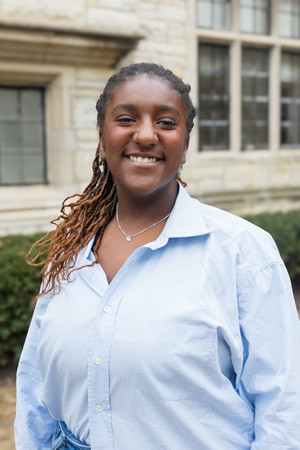Theatre for Good: One Student’s Work to Break Barriers
 When it comes to getting involved and giving back, Kate Horton tends to respond with a resounding “yes.”
When it comes to getting involved and giving back, Kate Horton tends to respond with a resounding “yes.”
The School of Communication senior theatre major takes part in both the playwriting and theatre management modules; is the artistic director of student theatre board WAVE Productions; will be directing the 83rd Annual Dolphin Show and peer-mentoring the advanced playwriting sequence; and currently serves on the Wildcat Welcome Board of Directors.
“My entire life,” she says, “I’ve found myself in either leadership positions or in positions of service to others.”
But it was her placement in the first-year seminar “The Sounds of Stories, Stories of Sounds” taught by emeritus professor Rives Collins and professor of instruction Stephan Moore that led to one “yes” that has been among her most rewarding.
Collins, seeing Horton’s promise, told her about the Northwestern Prison Education Project (NPEP), a bachelor’s degree-granting program for incarcerated students in Illinois for which Collins taught theatre and storytelling. Northwestern, he says, is the only top ten university in the country that grants a four-year degree to those who are admitted.
As part of an independent study in spring 2023, Horton signed on to assist Collins in teaching an introductory theatre course at Stateville Correctional Center in Crest Hill, Ill., about 53 miles southwest of Evanston. Despite the drab conditions, rumored dangers, and intimidating, almost propaganda-like use of military imagery decorating the entry, Horton found pleasant surprises within.
“You walk into a classroom,” she says, “and you encounter just the kindest, most thoughtful men you’ve ever met in your life. They welcomed me with such open and warm arms. And what was exciting is that these people, most of whom had never done theatre before, were talking about storytelling and art in a way that so differed from my lived experiences.”
Different, yes, but with notable similarities.
“The students are really motivated,” Collins says of the selective cohort. “Their willingness to try and put themselves out there is remarkable. Sometimes I forget where I am. We were talking about the conventions of the theatre: willing suspension of disbelief, the fourth wall, and so on. And I was asking somebody if they could unpack that for me, and one student compared it to an invisible wall through which people can look into someone else’s reality. And someone else said, ‘Yeah, like our cells.’ They are open-hearted.”
Horton was hooked from her first visit. And despite Collins’ recent retirement from Northwestern, he’s continued his involvement with NPEP and kept Horton in the loop as a peer mentor. Their students in the recent 140 course read such plays as Fences, The Exonerated, and Ever in the Glades, which was written by theatre department professor of instruction Laura Schellhardt.
“Whenever I go, I feel like am reminded of why I do theatre in the first place,” Horton says. “They always have beautiful perspectives.”
Last summer Collins and Horton codirected the students’ final performance titled “And So We Leave You With Hope.” Using choral speech, poetry, stories, and monologues, about two dozen students shared a piece of devised theatre for friends and loved ones gathered at Sheridan Correctional Center in Sheridan, Ill. (where many of NPEP’s incarcerated students have been transferred while Stateville is being rebuilt).
The storytelling, Horton says, depicted their grief, regret, trauma, but also joys, particularly when it came to their children.
“What was really exciting about doing theatre in a prison is that we're working with people who are seldomly able or have never had the chance to share their stories,” she says. “It means that art is meant to exist everywhere. The fact that some of the most inspiring pieces that I've ever seen are behind a literal wall, and that often their words aren't going to get out past that wall, but that doesn't mean that they don’t still exist.”
Horton adds: “I think there's a lot of bravery and vulnerability with that. I think that anyone who could participate in the NPEP program should. I think that it will really change our perspective on life, and on how we as a society have structured prison and restorative justice…the more voices that we can amplify, especially those of underrepresented or marginalized people, the better. We should really think about who we're giving a microphone and a stage to.”
To learn more about NPEP, visit the website or read Northwestern magazine’s 2020 piece about the program.
